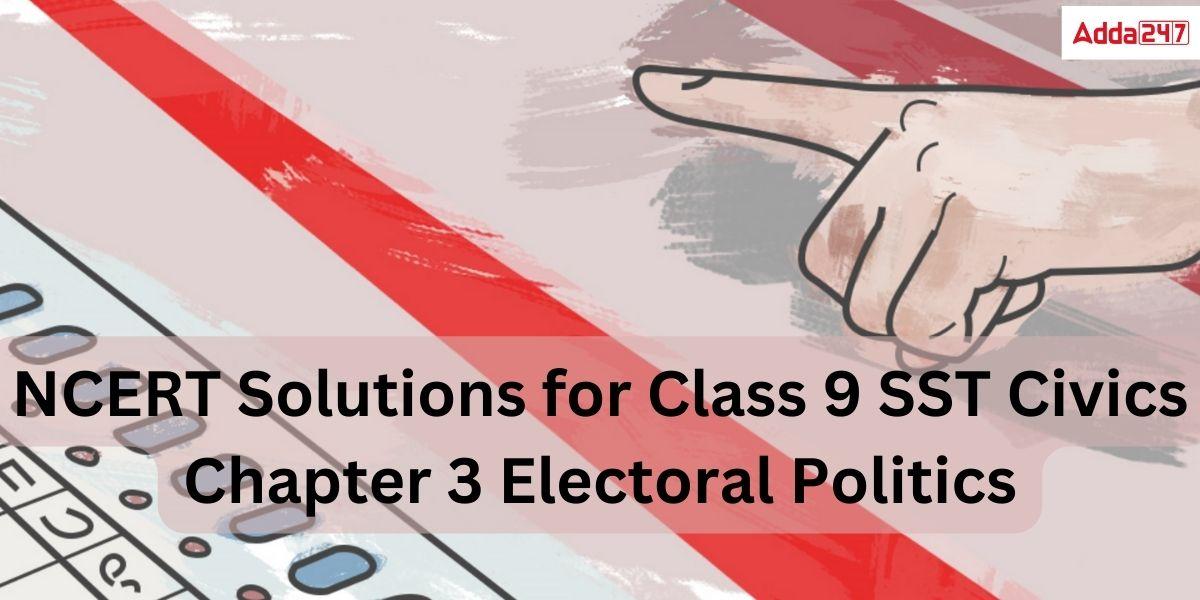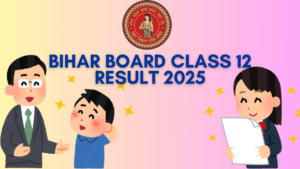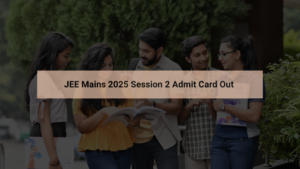Table of Contents
NCERT Solutions Class 9 SST Civics Chapter 3 Electoral Politics
NCERT Solutions for Class 9 SST Civics Chapter 3 Electoral Politics notes are provided in this article. NCERT Solutions for class 9 is the finest resource for getting a high score on the class 9 Examination. Adda247 Expert faculty team prepared NCERT Solutions for Class 9 SST Civics Chapter 3 Electoral Politics exercises of that chapter for a better grasp of the topics. These NCERT Solutions answer all questions in an easy and simple manner. These solutions will help you understand the concepts covered in the chapter completely. By writing these answers in the exam students will undoubtedly be able to achieve high scores. Keep learning with Adda247.
NCERT Solutions for Class 9 SST Civics Chapter 3 Electoral Politics Pdf
NCERT Solutions for Class 9 SST Civics Chapter 3 Electoral Politics Pdf is given in pdf format so students can easily download it for future use. Click here to download NCERT Solutions for Class 9 SST Civics Chapter 3 Electoral Politics
Class 9 SST Civics Chapter 3 Electoral Politics Video Explanation
Class 9 SST Civics Chapter 3 Electoral Politics Summary
Class 9 SST Civics Chapter 3 Electoral Politics explains how the country’s representatives are chosen, how these parties contest elections, and the rules that these parties must abide by, Topics and subtopics which are included in Class 9 SST Civics Chapter 3 Electoral Politics are
1. Why Elections?
- Assembly Election in Haryana
- Why do we need elections?
- What makes an election democratic?
- Is it good to have political competition?
2. What is Our System of Elections?
- Electoral constituencies
- Reserved Constituencies
- Voters’ list
- Nomination of candidates
- Election Campaign
- Polling and counting of votes
3. What Makes Elections In India Democratic?
- Independent Election Commission
- Popular participation
- Acceptance of election outcome
- Challenges to free and fair elections
NCERT Solutions for Class 9 SST Civics Chapter 3 Electoral Politics Questions with Answers
1. Which of the following statements about the reasons for conducting elections are false?
- Elections enable people to judge the performance of the government.
- People select the representative of their choice in an election.
- Elections enable people to evaluate the performance of the judiciary.
- People can indicate which policies they prefer.
Answer. c. Elections enable people to evaluate the performance of the judiciary.
2. Which of these is not a good reason to say that Indian elections are democratic?
- India has the largest number of voters in the world.
- India’s Election Commission is very powerful.
- In India, everyone above the age of 18 has a right to vote.
- In India, the losing parties accept the electoral verdict.
Answer. 1. India has the largest number of voters in the world.
3. Match the following :
| It is necessary to keep the voters list up to date because | There is a fair representation of all sections of our society |
| Some constituencies are reserved for SCs and STs so that | Everyone has an equal opportunity to elect their representative |
| Everyone has one and only one vote so that | All candidates must have a fair chance of competing in elections |
| Party in power is not allowed to use government vehicles because | Some people may have moved away from the area where they voted last |
Answer.
| It is necessary to keep the voters list up to date because | Some people may have moved away from the area where they voted last |
| Some constituencies are reserved for SCs and STs so that | There is a fair representation of all sections of our society |
| Everyone has one and only one vote so that | Everyone has an equal opportunity to elect their representative |
| Party in power is not allowed to use government vehicles because | All candidates must have a fair chance of competing in elections |
4. List all the different election-related activities mentioned in the chapter and arrange them in a time sequence, beginning with the first activity and ending with the last. Some of these activities are given below:
| releasing election manifestos counting of votes making of voters’ list election campaign declaration of election results casting of votes ordering of re-poll announcing election schedule filing nomination |
Answer.
Making of voters’ list → Announcing election schedule → Releasing election manifesto → Election campaign → Filing nomination → Casting of votes → Ordering of re- poll → Counting of votes → Declaration of election results.
5. Surekha is an officer-in-charge of ensuring free and fair elections in an assembly constituency in a state. Describe what she should focus on for each of the following stages of election:
- Election campaign
- Polling day
- Counting day
Answer.
a. Election Campaign: She must uphold law and order during the election campaign and ensure that appeals based on wealth or religion are prohibited. ensure that candidates cannot frighten or bribe voters, that they do not over the expenditure limit,
b. Polling Day: Along with verifying voter registration lists and identification, she must ensure free and fair elections. Avoid booth capture and maintain law and order on polling day.
c. Counting day: She must keep an eye on the procedure to make sure the counting is fair and prevent vote-rigging during the counting process
6. The table below gives the proportion of different communities among the candidates who won elections to the US Congress. Compare these to the proportion of these communities in the population of the US. Based on this, would you suggest a system of reservations in the US Congress? If yes, why and for which communities? If no, why not?
| Communities | The proportion of the Community (in per cent) | |
| House of representatives | Population of US | |
| Blacks | 8 | 13 |
| Hispanics | 5 | 13 |
| Whites | 86 | 70 |
Answer. Blacks and Hispanics ought to be given a reserve in the US Congress based on the percentage of each group in the US population. Compared to Whites, they have a lower representation in the US Congress.
7. Can we draw the following conclusions from the information given in this chapter? Give two facts to support your position for each of these.
1. Election Commission of India does not have enough powers to conduct free and fair elections in the country.
Answer: Election Commission of India have enough powers to conduct free and fair elections in the country:
-
- Election Commission has the authority to punish anyone who violates the code of conduct for elections.
- During election times, the relevant authority reports to the election commission rather than the government.
2. There is a high level of popular participation in the elections in our country.
Answer: Yes, because:
-
-
- In recent years, the number of voters has increased dramatically.
- People have been more actively involved in election-related activities in recent years.
-
3. It is very easy for the party in power to win an election.
Answer: No, it is because
The ruling party has repeatedly lost elections several times
The ruling party has previously lost elections despite extensive spending and campaigning.
4. Many reforms are needed to make our elections completely free and fair.
Answer. Yes. The conclusion is true because
- Reforms will make it easier for small parties to contest fair elections without facing too many obstacles.
- Trials in court must be completed quickly for contestants who are facing criminal charges. In order to prevent actual criminals from applying and give honest individuals a fair chance.
8. Chinappa was convicted of torturing his wife for dowry. Satbir was held guilty of practising untouchability. The court did not allow either of them to contest elections. Does this decision go against the principles of democratic elections?
Answer: No. It is totally fair that Chinappa and Satbir were barred from participating in elections as a result of the crime they committed. Anyone who has been found guilty of a crime does not have the right to live in society and as a result does not have the right to run for office.
9. Here are some reports of electoral malpractices from different parts of the world. Is there anything that these countries can learn from India to improve their elections? What would you suggest in each case?
- During an election in Nigeria, the officer in charge of counting votes deliberately increased the votes of one candidate and declared him elected. The court later found out that more than five lakh votes cast for one candidate were counted in favour of another.
- Just before elections in Fiji, a pamphlet was distributed warning voters that a vote for former Prime Minister, Mahendra Chaudhry will lead to bloodshed. This was a threat to voters of Indian origin.
- In the US, each state has its own method of voting, its own procedure of counting and its own authority for conducting elections. Authorities in the state of Florida took many controversial decisions that favoured Mr. Bush in the presidential elections in 2000. But no one could change those decisions.
Answer.
- The representatives of each party that nominated candidates in the election should be present on the day of vote counting to ensure a fair procedure. Nigeria should adopt this election rule that is used in India.
- The election commission in Fiji should establish an inquiry committee. The committee should identify candidates or political parties through inquiries, and prohibit them from participating in elections.
- The US can have one election commission, similar to India, but it should be free of political influence. the Commission that establishes regulations and ensures that elections are held fairly across the nation.
10. Here are some reports of malpractices in Indian elections. Identify what the problem in each case is. What should be done to correct the situation?
- Following the announcement of elections, the minister promised to provide financial aid to reopen the closed sugar mill.
- Opposition parties alleged that their statements and campaign was not given due attention in Doordarshan and All India Radio.
- An inquiry by the Election Commission showed that electoral rolls of a state contain name of 20 lakh fake voters.
- The hoodlums of a political party were moving with guns, physically preventing supporters of other political parties to meet the voters and attacking meetings of other parties.
Answer.
- According to the Code of Conduct, it is unlawful to declare policy decisions after the election has been announced. A candidate must abide by the Code of Conduct during the election and must stay away from making any promises. Therefore, in this case, the Election Commission should convey to the minister about this.
- All political parties must be given an equal chance to appear on Doordarshan and All India Radio, according to the election commission. The EC takes action to stop the abuse of these media.
- The presence of fake voters implies that the elections were pre-planned by the officials who formed the electoral rolls, hence the Election Commission should declare re-elections.
- The political party is scaring its opponents by using hoodlums. The party should be banned from the elections, and the election commission should order the arrest of criminals.
11. Ramesh was not in class when this chapter was being taught. He came the next day and repeated what he had heard from his father. Can you tell Ramesh what is wrong with these statements?
- Women always vote the way men tell them to. So what is the point of giving them the right to vote?
- Party politics creates tension in society. Elections should be decided by consensus not by competition.
- Only graduates should be allowed to stand as candidates for elections.
-
Answer.
- An individual can cast a secret ballot for the party of his or her choice during elections. Women are capable of making individual judgments and utilizing their right to vote.
- Competition must be encouraged since it drives people to produce better work than their peers, which is why it is so vital. Election competition ensures that candidates put up a lot of effort into society.
- It is not necessary to get a degree to comprehend the needs of the population and advocate their interests. Therefore, it should be fair if a non-graduate wishes to run for election.
NCERT Solutions for Class 9 SST Civics Chapter 3 Electoral Politics video solution
NCERT Solutions for Class 9 SST Civics Chapter 3 Electoral Politics -FAQs
Q.What is electoral roll Class 9 electoral politics?
In a democratic election, everyone receives a list of persons who are entitled to vote, which is formally known as the Electoral Roll but is more frequently referred to as the Voters’ List.
Q.How can I access the online PDF version of the NCERT Solutions for Class 9 SST Civics Chapter 3 Electoral Politics?
Ans. The NCERT Solutions for Class 9 SST Civics Chapter 3 Electoral Politics PDF may be downloaded using the link in the article.
Q. What are the advantages of using Adda247’s NCERT Solutions for Class 9 SST Civics Chapter 3 Electoral Politics?
Ans. The advantages of using NCERT Solutions for Class 9 SST Civics Chapter 3 Electoral Politics from Adda247 include the following:
-
- The NCERT solution as well as a video explanation
- Additionally, a PDF is included, which can be downloaded and saved for future use



 Bihar Board 12th Result 2025 Out @ inter...
Bihar Board 12th Result 2025 Out @ inter...
 JEE Mains 2025 Session 2 Admit Card Out,...
JEE Mains 2025 Session 2 Admit Card Out,...
 Join ONE-Pro-Max - MAHAPACK for NEET-UG ...
Join ONE-Pro-Max - MAHAPACK for NEET-UG ...









